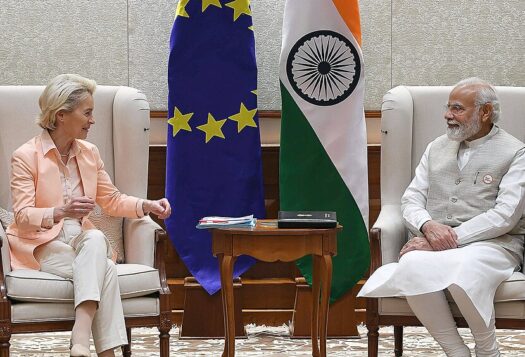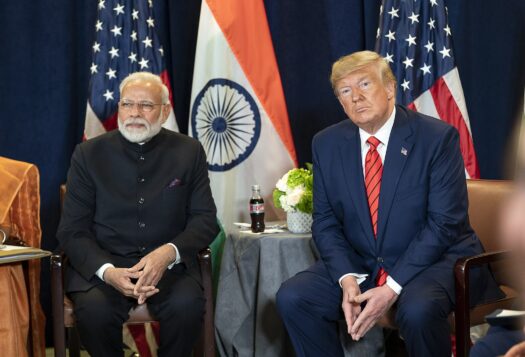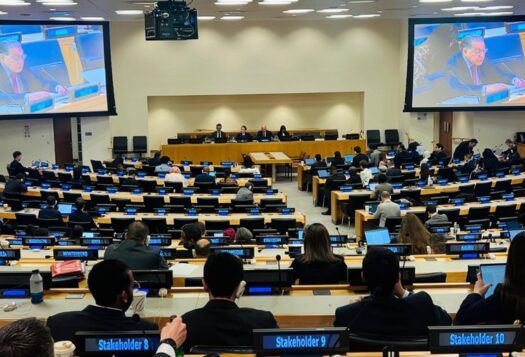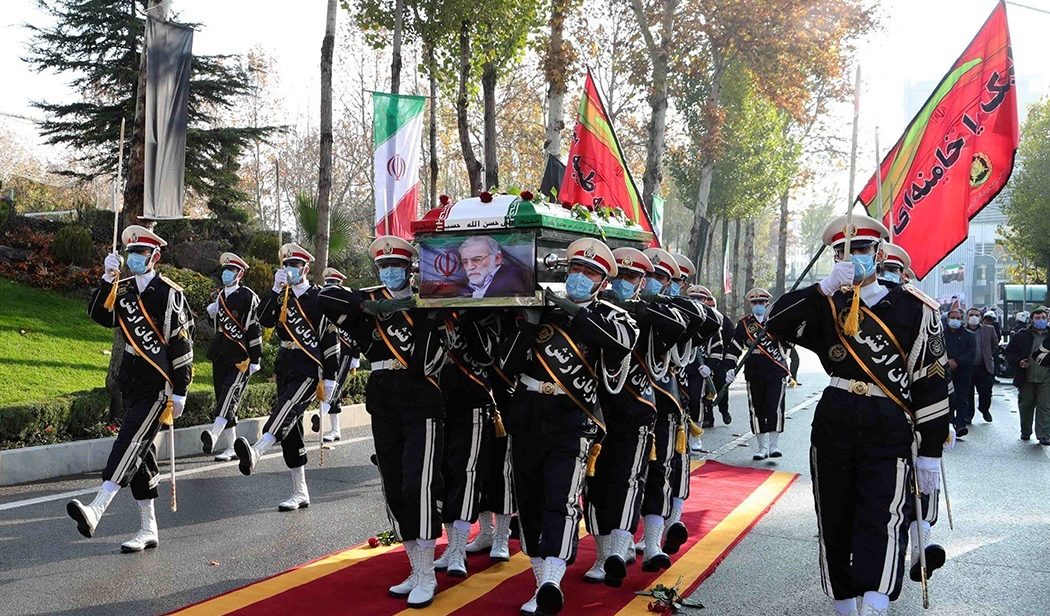
On November 27, Iranian nuclear scientist Mohsen Fakhrizadeh was killed in the suburbs of Tehran. While Israeli officials, the C.I.A, and the White House officially declined to comment, intelligence officials confirmed to the New York Times that Israel was responsible for the assassination. In a 2018 speech alleging that Iran sought to develop nuclear weapons, Israeli Prime Minister Benjamin Netanyahu showed Fakhrizadeh’s image and named him as the head of an alleged weapons development project, telling his audience to: “Remember that name.” Israel has employed targeted assassinations, illegal under international law, to stymie Iran’s nuclear program before, in the string of killings of Iranian physicists from 2010-2012. There is further precedent for Israeli-American cooperation in this arena. Leaks from an intelligence program known as Operation Olympic Games revealed that the United States and Israel worked together on a series of cyberattacks on Iranian nuclear facilities. The two states have also coordinated on other efforts to cripple Iran’s nuclear development, which Iran maintains is a civilian program and in accordance with its rights as an NPT signatory.
Given this history of collaboration, there is reason to believe that the United States had prior knowledge, approved of, or even assisted in Fakhrizadeh’s killing. Israeli media reported that Netanyahu had met with U.S. Secretary of State, Mike Pompeo, and Mohammad bin Salman, Saudi Arabia’s crown prince, further fueling suspicions of U.S. involvement. President-elect Joe Biden has announced his intention to return the U.S. to the Joint Comprehensive Plan of Action (JCPOA), an action opposed by the hardliners in the Trump administration. The assassination of Fakhrizadeh, then, like the harmful sanctions the United States has levied against Iran, is likely an attempt to scuttle a return to JCPOA compliance, a decision with clear impact on Pakistan and Iran’s other neighbors.
Pakistan made no statement until almost a week after Fakhrizadeh’s assassination. This delay reflects Pakistan’s delicate position in the shifting geostrategic alignment surrounding the Persian Gulf, and in the Indian Ocean region more broadly.
Iranian state media touted prompt criticisms of the murder by a number of key actors including China, Russia, the at-odds Armenia and Azerbaijan, Turkey, and Iraq. Both Sri Lanka and Afghanistan issued condemnations shortly after the killing, but Pakistan made no statement until almost a week after Fakhrizadeh’s assassination. This delay reflects Pakistan’s delicate position in the shifting geostrategic alignment surrounding the Persian Gulf, and in the Indian Ocean region more broadly.
The Evolution of Pakistan-Iran Ties
Pakistan has experienced growing trouble with its erstwhile supporters among the Gulf Arab states, many of whom have accelerated strategic and economic cooperation with Pakistan’s rival, India. Critically, despite a historically strong Indo-Iranian relationship, the Islamic Republic has repeatedly decried the abrogation of Article 370 and the increased securitization of Kashmir. Earlier this year, frustrated by inaction regarding the change in Kashmir’s constitutional status, Pakistan issued a rare public criticism of Saudi Arabia. Foreign Minister Shah Mehmood Qureshi called on the Saudi-led Organization of Islamic Cooperation (OIC) to gather a meeting of the Council of Foreign Ministers on the Kashmir crisis, warning that if it did not, Pakistan would turn to sessions outside of the OIC. Qureshi’s statement was likely a veiled reference to an alternative forum including Malaysia, Turkey, Qatar, and Iran, which had convened in Kuala Lumpur in December of 2019. Pakistan had been invited to participate in this forum, but had withdrawn at Saudi Arabia’s request, which Qureshi referenced in his appeal to the Gulf states for stronger support on Kashmir.
Although the OIC recently affirmed Pakistan’s position on Kashmir, in the wake of Qureshi’s comments, Saudi Arabia was quick to retaliate. Saudi Arabia recalled a loan of USD $1 billion and did not renew a USD $3.2 billion oil credit, forcing Pakistan to rely on China for a replacement loan. Long economically dependent on the Gulf Arab states for favorable loans and its remittance economy, Pakistan is now in a delicate position. This precarity is intensified by rumored pressure from the United States and Saudi Arabia for Pakistan to normalize relations with Israel, a politically unsavory option for the ruling PTI party. Prime Minister Imran Khan has drawn parallels between Kashmir and Palestine, and the PTI relies on Islamist discourses to maintain its political coalition. Saudi Arabia publicly contends that it will not normalize relations with Israel until a Palestinian state is recognized. The speed and persistence with which these rumors spread nonetheless speaks to the concern many in Pakistan may feel about the country’s reliance on patronage from the Arab Gulf states, particularly Saudi Arabia, which has supported the Trump administration’s aggressive behavior to undermine any return to the JCPOA under Biden.
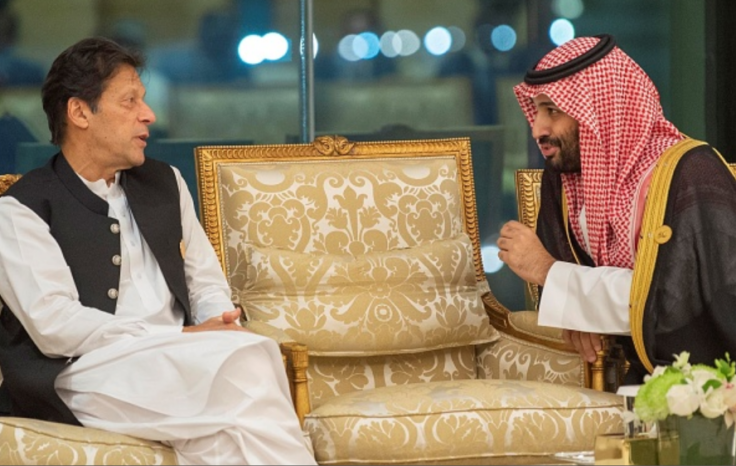
These snags may make strengthening Pakistan’s relationship with the emerging Chinese axis around the Persian Gulf more appealing. Many Pakistani officials and analysts have eagerly watched the negotiations of the economic cooperation pact between China and Iran, which could offer Pakistan economic and security frameworks to lessen its dependence in these areas on the United States and Saudi Arabia. With the future of this alignment structure uncertain, however, and in light of worldwide economic difficulties wrought by the COVID-19 pandemic, Pakistan cannot yet afford to risk a steeper decline in its ties with these long-time partners.
Nonetheless, all signatories of the JCPOA returning to compliance is likely in Pakistan’s best interests. Preventing an arms race or tit-for-tat escalation is key to regional stability and the end of U.S. sanctions on Iran could create the opportunity for Pakistan to expand economic cooperation with its neighbor to the west. Prime Minister Imran Khan’s delayed public statements on the assassination, then, speaks to Pakistan’s delicate network of alliances, which requires balancing the interests and desires of the United States, the Gulf Arab nations, and increasingly, China and its partners in the region.
Roadblocks for the Biden Administration and Implications for Pakistan
On the Iranian side, meanwhile, the murder of Fakhrizadeh is likely to worsen the United States’ already shattered reputation, decreasing support for returning to compliance or further negotiations if the Biden administration were to re-join the JCPOA. Already, in the wake of the attack, Iran has further ramped up its uranium-enrichment program. Polling in the Islamic Republic showed that, following the United States’ exit from the JCPOA and the enactment of crippling economic sanctions, a large majority of the population supports this policy of progressive non-compliance, demonstrating the United States’ so-called “maximum pressure” campaign has done little to promote non-proliferation goals in the region.
The United States’ actions and the struggles of international bodies to maintain the benefits of the JCPOA following American withdrawal have damaged the political credibility of Western-led coalitions. With this in mind, Iran is likely to look to deepen its ties to Qatar, Turkey, and China, all of whom could also prove expedient partners for Pakistan.
Last week, the hardliner-dominated Majles passed a bill dictating that, if European countries did not provide relief from U.S sanctions, Iran would suspend UN inspections and increase its uranium enrichment to 20 percent, a level exceeding that needed for civilian purposes but falling short of the threshold required for nuclear weapons. President Rouhani, a relative moderate, vetoed the bill, arguing it would only hurt diplomacy for the incoming Biden administration, falling into his pattern of urging a prudent response to U.S. and Israeli aggression. However, even with this anticipated shift in U.S. diplomacy, years of sanctions, an ill-advised American military presence in the Middle East and South Asia, and the targeted assassinations of figures like Fakhrizadeh and General Qassem Soleimani has empowered hardliners within the Islamic Republic who oppose negotiations and advocate for a more expansive nuclear program.
An Iran seeking to leverage new relationships and dynamics in the region could affect a similarly-oriented Pakistan. Polls in 2019 indicated that a plurality of Iranians endorsed strengthening relations with other Asian states over European ones, a trend likely exacerbated by the events of 2020. The United States’ actions and the struggles of international bodies to maintain the benefits of the JCPOA following American withdrawal have damaged the political credibility of Western-led coalitions. With this in mind, Iran is likely to look to deepen its ties to Qatar, Turkey, and China, all of whom could also prove expedient partners for Pakistan. The direction of the relationship, of course, is not yet set. Access to hydrocarbons and remittances make Saudi Arabia and its Gulf allies too valuable a relationship to jettison entirely, meaning Pakistan will need to balance their rivalry with Iran for the foreseeable future. Ongoing contentious negotiations for a peace agreement in Afghanistan also could prove a point of friction for Iran and Pakistan, as could the Indo-Iranian relationship. On the whole, however, re-alignment in the Persian Gulf and Indian Ocean could provide the opportunity for Iran and Pakistan to transform their long-touted cultural linkages into more lasting geopolitical partnership.
***
